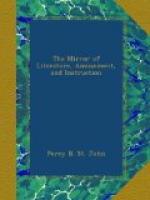* * * * *
Of the abhorrence with which the Dutch regard the French tongue, the following lines of Bilderdyk are an amusing example:—
Begone, thou bastard-tongue! so base—so
broken—
By human jackals and hyaenas spoken;
Formed for a race of infidels, and fit
To laugh at truth—and scepticize
in wit;
What stammering, snivelling sounds, which
scarcely dare,
Bravely through nasal channels meet the
ear—
Yet helped by apes’ grimaces—and
the devil,
Have ruled the world, and ruled the world
for evil!
Ibid.
* * * * *
COALS.
One of the pamphlets of the age of the Commonwealth is said, in the title-page, to be
Printed
in the year
That sea-coal was exceeding dear.
The remembrance of this inconvenience, which the Londoners had suffered during the stoppage of their supply from Newcastle, made “the committees of both kingdoms conclude and agree among themselves, that some of the most notorious delinquents and malignants, late coal-owners in the town of Newcastle, be wholly excluded from intermeddling with any shares or parts of colleries;” “but as the parliament might find a difficulty in driving on the trade, they did not conceive it for their service to put out all the said malignants at once, but were rather constrained, for the present, to make use of those delinquents in working their own collieries as tenants and servants.” The more stubborn and wealthy, therefore, were selected for example; and the others had this favour shown them.
* * * * *
LADY-POETS OF ENGLAND.
The following is a Frenchman’s expression of homage to our modern female poets, in which we excel all the world:—
It is remarkable, that in the latter years of the eighteenth century, and also during the whole course of our revolution, there appeared in England a whole school, as it were, of female authors, whose pure and graceful productions are disfigured by no exaggerations, nor are they of that sombre character which distinguishes the modern literature of their country. Of the lady-authors of England, the most celebrated is Lady Wortley Montagu, the contemporary of Pope, who has left poems, but more especially letters, highly remarkable for their talent and philosophy. It is impossible to give here the names of the authoresses who appeared all on a sudden about half a century after Lady Wortley Montagu. One of the earliest of them was a lady of the same name, Mrs. E. Montagu, the author of the Essays on Shakspeare, and Mrs. Anna Laetitia Barbauld, who wrote numerous poems and admirable hymns for children. There is great beauty in the Epistle of Mrs. Barbauld to Wilberforce, on the subject of the Abolition of




